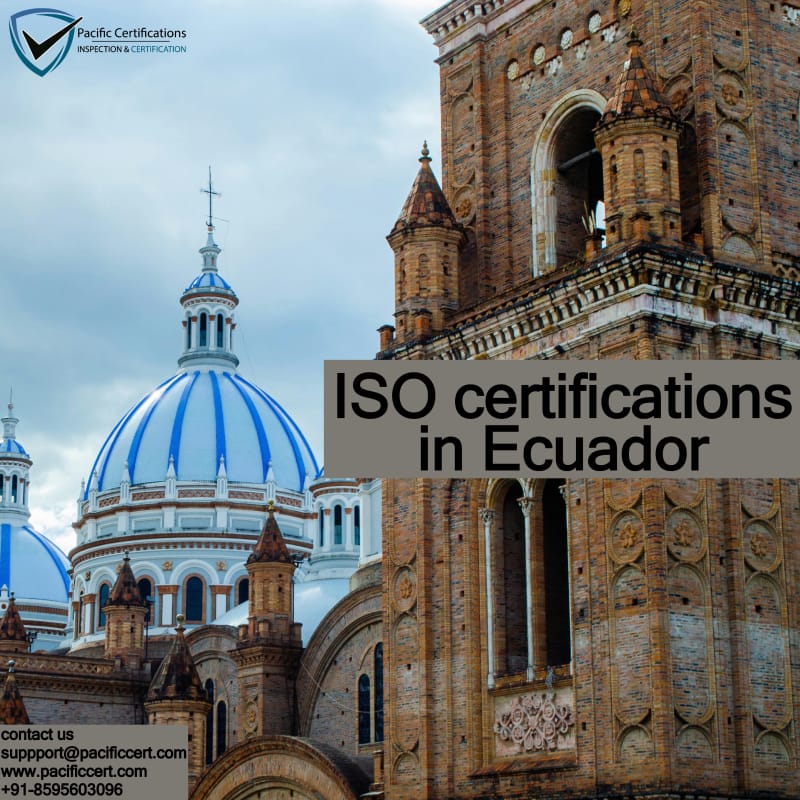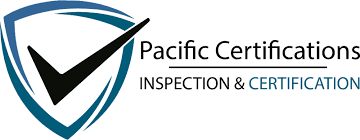ISO Certifications in Ecuador, Popular Standards, Requirements and Benefits

Introduction
ISO certifications play a crucial role in enhancing the operational efficiency, credibility, and marketability of organizations worldwide, including those in Ecuador. These certifications are based on international standards developed by the International Organization for Standardization (ISO), designed to ensure quality, safety, efficiency, and trustworthiness across various aspects of business operations. We, Pacific Certifications, are an accredited certification body helping organizations in Ecuador and beyond to achieve and maintain these standards through rigorous audits and certification processes.
Key ISO Certifications and Applicable Standards
Several ISO certifications are particularly relevant and beneficial for organizations in Ecuador, across various industries:
ISO 9001: Quality Management Systems (QMS)
Applicability: This standard applies to any organization that wants to improve its overall quality management and ensure that its products or services consistently meet customer and regulatory requirements.
Benefits: Improved quality and consistency of services and products, increased customer satisfaction, and enhanced business performance.
ISO 14001: Environmental Management Systems (EMS)
Applicability: Suitable for organizations aiming to manage their environmental responsibilities in a systematic manner that contributes to the environmental pillar of sustainability.
Benefits: Enhanced environmental performance, reduced waste and energy use, and improved compliance with environmental regulations.
ISO 45001: Occupational Health and Safety Management Systems
Applicability: Organizations of all sizes seeking to improve employee safety, reduce workplace risks, and create better, safer working conditions.
Benefits: Improved employee safety, reduced workplace risks, and enhanced health and well-being at work.
ISO 27001: Information Security Management Systems (ISMS)
Applicability: Relevant for organizations that wish to secure their information assets, such as financial information, intellectual property, employee details, or information entrusted by third parties.
Benefits: Secured information assets, increased resilience to cyber attacks, and improved customer and stakeholder confidence in how the organization manages risk.
Click here to find out more applicable standards to your industry
How Pacific Certifications Can Assist?
Pacific Certifications provides comprehensive services to assist organizations in Ecuador with obtaining and maintaining ISO certifications through:
Gap Analysis:
Identifying the current status of your organization in relation to the desired ISO standard. This step helps in understanding the areas that need improvement before formal assessment.
Pre-Assessment Audits:
Conducting a preliminary audit to identify any potential gaps against the requirements of the standard and providing feedback on areas for improvement.
Certification Audits:
Performing a two-stage audit process. The Stage 1 audit assesses the readiness of the organization's management system for the full assessment. The Stage 2 audit evaluates the effectiveness of the management system in meeting the ISO standards.
Surveillance Audits:
Conducting periodic audits to ensure ongoing compliance with the ISO standard and continual improvement of the management system.
Training and Support:
Offering various training programs to educate and prepare your team on the requirements of the ISO standards and best practices for implementing and maintaining an effective management system.
We are equipped to guide organizations through the intricate process of achieving ISO certification. This support encompasses initial consultation and gap analysis, through to auditing, certification, and beyond with continuous improvement and surveillance audits. The goal is to not only achieve certification but to ensure that the organization benefits from the implementation of systematic and globally recognized management practices that ISO standards promote.
Requirements of ISO Certifications in Ecuador
The requirements for ISO certifications in Ecuador, as in other countries, are principally based on the specific standards for which certification is sought. These standards outline the criteria that an organization must meet to ensure that its products, services, or management systems conform to internationally recognized levels of quality and efficiency. While the requirements can vary significantly from one ISO standard to another, they emphasize the establishment, implementation, maintenance, and continuous improvement of a management system tailored to the organization's objectives and the nature of its operations.
Below is an overview of the general requirements for some of the most sought-after ISO certifications in Ecuador:
ISO 9001: Quality Management Systems (QMS) Requirements
Leadership Commitment: Top management must demonstrate leadership and commitment to the QMS.
Customer Focus: Organizations must ensure customer requirements are identified and met, aiming to enhance customer satisfaction.
Process Approach: Understanding and managing interrelated processes as a system contributes to the organization's effectiveness and efficiency in achieving its objectives.
Improvement: The organization must continually improve its processes and overall management system.
ISO 14001: Environmental Management Systems (EMS) Requirements
Environmental Policy: Development of an environmental policy that reflects the organization's commitment to environmental protection.
Planning: Identification of environmental aspects, legal requirements, and setting environmental objectives and planning actions to achieve them.
Operational Control: Implementing controls to manage significant environmental aspects and comply with legal and other requirements.
Performance Evaluation: Monitoring and measuring progress towards environmental objectives and reporting on performance.
ISO 45001: Occupational Health and Safety Management Systems Requirements
Worker Participation: Involvement of workers in the development, planning, implementation, and continuous improvement of the management system.
Hazard Identification and Risk Assessment: Systematically identifying and assessing occupational health and safety risks.
OH&S Objectives: Setting and working towards occupational health and safety objectives to improve OH&S performance.
Emergency Preparedness and Response: Planning and implementing actions to address potential emergency situations.
ISO 27001: Information Security Management Systems (ISMS) Requirements
Risk Assessment: Identification and assessment of information security risks.
Security Policy: Development and implementation of an information security policy that is communicated within the organization and to interested parties.
Asset Management: Identifying information assets and defining appropriate protection responsibilities.
Access Control: Limiting access to information and information processing facilities to those authorized.
Organizations in Ecuador seeking ISO certification must prepare by developing and implementing management systems that meet these standards, conducting internal audits to ensure ongoing compliance, and then undergoing an external audit by a certification body. This rigorous process ensures that certified organizations operate at the highest international standards, bringing numerous benefits, including improved efficiency, reduced risk, and enhanced credibility with customers and partners.
Benefits of ISO Certifications in Ecuador
ISO certifications offer a wide range of benefits to organizations in Ecuador, enhancing their operational, environmental, and safety performance, while also improving marketability and credibility in both domestic and international markets. These certifications are recognized globally and can play a pivotal role in the success and sustainability of businesses by ensuring that they meet international standards of quality and efficiency. Here are some of the key benefits organizations in Ecuador can achieve through ISO certifications:
Enhanced Quality and Efficiency
ISO 9001 certification ensures that organizations have a robust quality management system (QMS) in place, leading to improved product quality, service delivery, and customer satisfaction. This standard requires organizations to identify and address inefficiencies, thereby optimizing operations and reducing costs.
Environmental Responsibility
ISO 14001 certification demonstrates an organization's commitment to environmental management and sustainability. By implementing an effective environmental management system (EMS), organizations can reduce waste, conserve resources, and minimize their environmental footprint, which is increasingly important to consumers, investors, and regulators.
Improved Health and Safety
ISO 45001 certification helps organizations to establish a safer working environment, reducing the risk of work-related accidents and diseases. This not only benefits the well-being of employees but also reduces costs associated with workplace accidents and insurance.
Enhanced Data Security
ISO 27001 certification is essential for organizations that manage significant amounts of data and sensitive information. It helps in establishing a robust information security management system (ISMS), protecting data from breaches and cyber-attacks, and ensuring confidentiality, integrity, and availability of information.
Marketability and Global Recognition
ISO certifications are internationally recognized, signaling to customers, partners, and regulators that an organization adheres to the highest standards of quality, safety, and environmental responsibility. This can open up new market opportunities, particularly in sectors or regions where such certifications are a prerequisite for doing business.
Compliance and Risk Management
Adhering to ISO standards helps organizations comply with legal and regulatory requirements, reducing the risk of non-compliance penalties. It also improves risk management processes by identifying potential issues and implementing preventive measures.
Continuous Improvement
ISO standards emphasize continuous improvement, requiring organizations to regularly assess their processes and make improvements. This ensures that businesses remain competitive and continue to meet the needs of their customers and stakeholders.
Which industries need ISO Certifications in Ecuador?
ISO certifications are versatile and applicable across a broad spectrum of industries, providing a framework for quality, safety, environmental management, and information security that benefits virtually any organization. In Ecuador, as in other parts of the world, certain industries find particular value in obtaining ISO certifications due to regulatory requirements, market demands, or the specific operational challenges they face.
Here's an overview of industries in Ecuador that commonly seek ISO certifications and how these certifications support their operational and strategic objectives:
Manufacturing and Production
ISO 9001 (Quality Management Systems) is almost universal in its applicability, ensuring that manufacturing processes are efficient and consistently produce high-quality products that meet customer expectations.
ISO 14001 (Environmental Management Systems) helps manufacturing entities minimize their environmental impact, which is increasingly important for compliance with environmental legislation and meeting the expectations of eco-conscious consumers.
Information Technology and Telecommunications
ISO/IEC 27001 (Information Security Management Systems) is critical for protecting sensitive data against cyber threats, ensuring data integrity, and maintaining customer trust in an era of frequent data breaches.
Construction and Engineering
ISO 45001 (Occupational Health and Safety Management Systems) is particularly relevant for mitigating the risks associated with construction and engineering work, ensuring worker safety, and reducing the likelihood of costly accidents and litigation.
Food Industry
ISO 22000 (Food Safety Management Systems) ensures the safety of food products from farm to fork, critical for protecting public health and meeting both local and international regulatory requirements.
ISO 9001 can also be applied to enhance quality management processes within the food production and distribution chains.
Healthcare and Pharmaceuticals
ISO 13485 (Medical Devices - Quality Management Systems) is designed for organizations involved in the design, production, installation, and servicing of medical devices, ensuring product safety and efficacy.
ISO 9001 and ISO 27001 are also important for general quality management and protecting patient data, respectively.
Energy and Utilities
ISO 50001 (Energy Management Systems) helps organizations in this sector improve their energy performance, reduce costs, and lower greenhouse gas emissions.
ISO 14001 is critical for managing environmental impact and complying with environmental regulations.
Education and Training
ISO 21001 (Educational Organizations - Management Systems for Educational Organizations) supports educational institutions in providing high-quality education and ensuring learner satisfaction.
Financial Services
ISO/IEC 27001 is essential for protecting financial data and ensuring the integrity of financial transactions, while ISO 9001 can enhance customer service and operational efficiency.
Logistics and Transportation
ISO 9001 helps logistics and transportation companies streamline their operations and improve customer satisfaction by ensuring reliable and efficient service delivery.
Tourism and Hospitality
ISO 9001 and ISO 14001 are beneficial for enhancing customer satisfaction through quality management and sustainable environmental practices, essential in a country like Ecuador that relies heavily on tourism.
Conclusion
For organizations within these industries seeking ISO certification in Ecuador, we can provide tailored support throughout the certification process. This includes conducting initial gap analyses, offering targeted training programs, facilitating pre-assessment audits, and performing the formal certification and surveillance audits.
Pacific Certifications is accredited by ABIS, in case you need support with ISO certification for your business in Ecuador, please contact us at [email protected] or +91-8595603096.
Ready to get ISO certified?
Contact Pacific Certifications to begin your certification journey today!
Suggested Certifications –
Read more: Pacific Blogs
